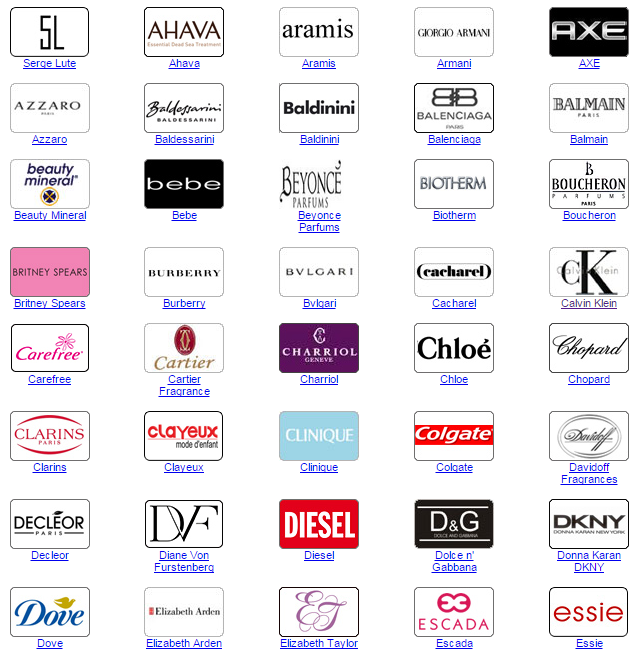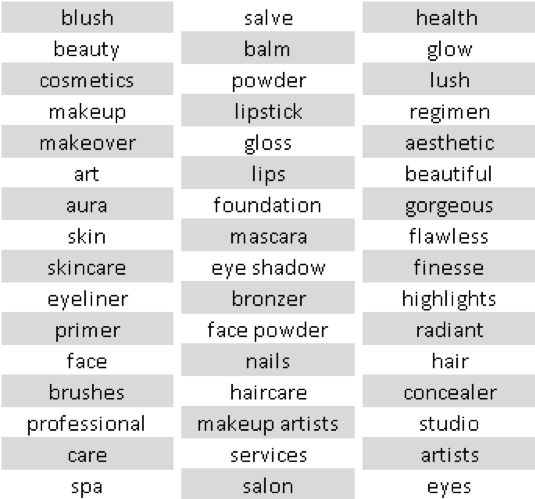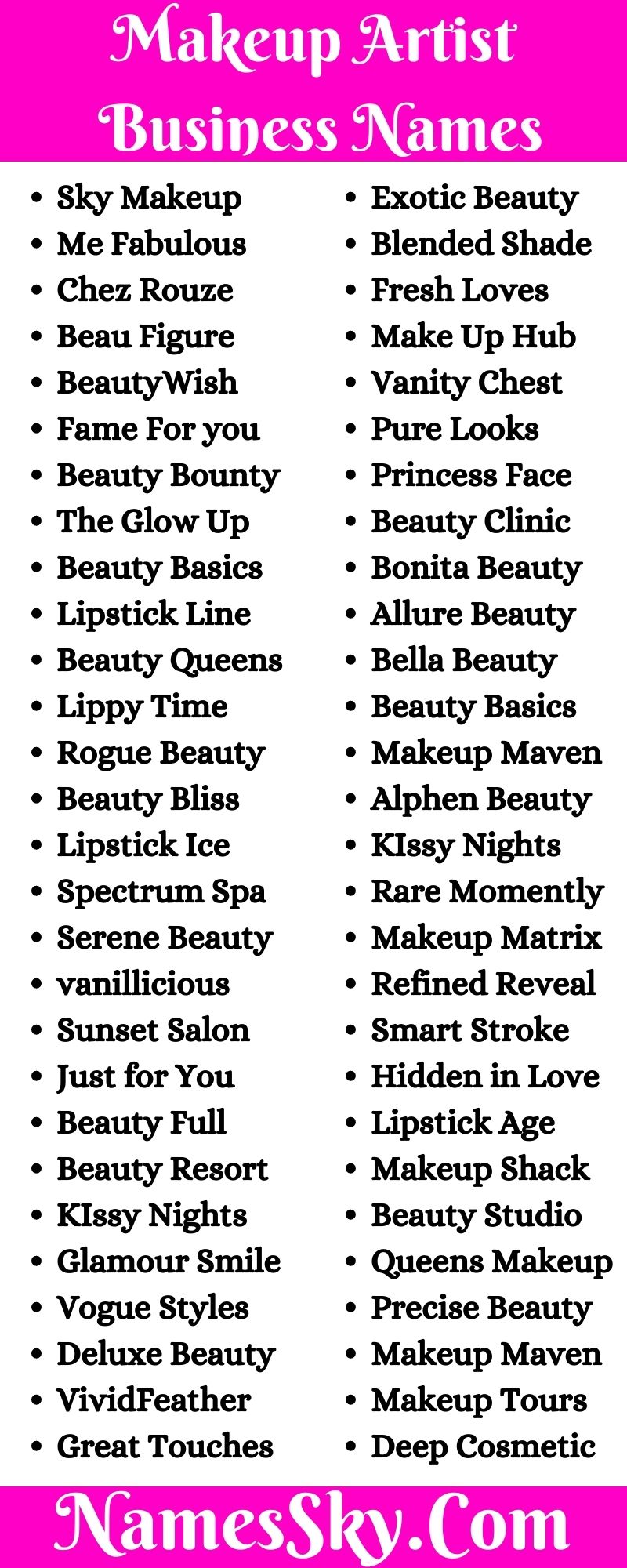The Art Of Naming: A Comprehensive Guide To Makeup Company Names
The Art of Naming: A Comprehensive Guide to Makeup Company Names
Related Articles: The Art of Naming: A Comprehensive Guide to Makeup Company Names
Introduction
With great pleasure, we will explore the intriguing topic related to The Art of Naming: A Comprehensive Guide to Makeup Company Names. Let’s weave interesting information and offer fresh perspectives to the readers.
Table of Content
The Art of Naming: A Comprehensive Guide to Makeup Company Names

In the competitive landscape of the beauty industry, a compelling name is more than just a label; it is a powerful tool for establishing brand identity, attracting customers, and ultimately, driving success. A well-chosen name for a makeup company serves as a first impression, conveying a brand’s essence, values, and target audience.
The Importance of a Strong Makeup Company Name
A strong makeup company name possesses several key attributes that contribute to its effectiveness:
- Memorability: A name that is easy to remember and recall will stick in the minds of potential customers, enhancing brand recognition.
- Relevance: The name should be relevant to the brand’s products, target audience, and overall aesthetic. It should evoke the desired emotions and associations.
- Uniqueness: A distinct name that stands out from the competition helps a brand establish its own identity and avoid confusion.
- Scalability: The name should be adaptable and versatile enough to accommodate future product lines and market expansions.
- Availability: A crucial factor is ensuring the name is available for registration as a trademark and domain name.
Crafting a Winning Makeup Company Name
The process of choosing a name for a makeup company requires careful consideration and a strategic approach. Here are some key steps to guide the process:
-
Define Your Brand Identity: Before brainstorming names, clearly define your brand’s mission, values, target audience, and overall aesthetic. What makes your brand unique? What message do you want to convey?
-
Conduct Market Research: Analyze the names of existing makeup brands in your target market. Identify common naming conventions, popular themes, and areas where you can differentiate yourself.
-
Brainstorming and Ideation: Generate a wide range of potential names based on your brand identity and market research. Consider words, phrases, concepts, and even cultural references that resonate with your target audience.
-
Evaluate and Narrow Down Options: Assess each name based on the criteria outlined earlier: memorability, relevance, uniqueness, scalability, and availability. Eliminate names that are too generic, difficult to pronounce, or already in use.
-
Check Availability: Verify that your chosen name is available for trademark registration and domain name acquisition. This ensures you have exclusive rights to the name and can build your brand without legal complications.
-
Seek Feedback: Gather feedback from potential customers, industry experts, and trusted advisors. Their insights can help refine your choices and identify any potential issues or limitations.
Types of Makeup Company Names
Makeup company names can be broadly categorized into several types, each with its own strengths and weaknesses:
-
Descriptive Names: These names directly describe the brand’s products or services, such as "Natural Beauty Cosmetics" or "Luminous Skin Solutions." They offer clarity and inform customers about the brand’s focus. However, they can be less memorable and may lack the emotional impact of more evocative names.
-
Evocative Names: These names evoke emotions, feelings, or associations related to the brand’s aesthetic or values. Examples include "Bloom Cosmetics" or "Enchanted Beauty." They are often more memorable and can create a stronger brand identity. However, they may not be as clear about the brand’s offerings.
-
Brandable Names: These names are typically short, memorable, and easily pronounceable, often consisting of invented words or unique combinations. Examples include "NARS Cosmetics" or "MAC Cosmetics." They offer a high degree of brand recognition and flexibility. However, they may not be as descriptive or evocative as other types of names.
-
Personalized Names: These names are based on the founder’s name or a personal story, such as "Sarah’s Beauty Emporium" or "The Alchemist’s Palette." They can create a sense of authenticity and connection with customers. However, they may limit the brand’s scalability and appeal to a broader audience.
Tips for Creating a Successful Makeup Company Name
- Keep it Short and Simple: A concise name is easier to remember and pronounce, making it more likely to stick in customers’ minds.
- Use Strong Imagery: Choose words or phrases that evoke visual imagery and create a strong association with your brand’s aesthetic.
- Consider Cultural References: Drawing inspiration from cultural trends, art, or literature can add depth and intrigue to your name.
- Check for Similar Names: Ensure your chosen name is unique and doesn’t closely resemble existing brands to avoid confusion and potential legal issues.
- Test Your Name: Use online surveys, focus groups, or social media polls to gauge public reaction to your potential names and refine your choices.
FAQs About Makeup Company Names
Q: What are some common mistakes to avoid when choosing a makeup company name?
A: Avoid names that are too generic, difficult to pronounce, or already in use. Also, steer clear of names that are offensive, culturally insensitive, or misleading.
Q: How important is a domain name for a makeup company?
A: A domain name is crucial for establishing an online presence, building a website, and promoting your brand. Secure a domain name that aligns with your chosen company name to ensure a consistent and recognizable brand identity.
Q: Can I use a name that is already registered as a trademark?
A: Using a name that is already registered as a trademark can lead to legal complications and potential lawsuits. Conduct thorough trademark searches before finalizing your chosen name.
Q: Should I focus on a specific target audience when choosing a name?
A: Yes, understanding your target audience is crucial. Consider their demographics, preferences, and cultural influences when brainstorming names. A name that resonates with your target audience will be more effective in attracting their attention.
Conclusion
Choosing the right name for a makeup company is a critical step in building a successful brand. A well-chosen name serves as a foundation for brand identity, customer recognition, and market success. By following the steps outlined above, carefully considering the various factors involved, and seeking feedback from relevant sources, entrepreneurs can create a name that effectively communicates their brand’s essence and resonates with their target audience.








Closure
Thus, we hope this article has provided valuable insights into The Art of Naming: A Comprehensive Guide to Makeup Company Names. We hope you find this article informative and beneficial. See you in our next article!
You may also like
Recent Posts
- Mastering The Art Of Eye Makeup: A Comprehensive Guide To The Color Wheel
- The Art Of Enhancement: A Comprehensive Guide To Makeup
- The Ultimate Guide To Makeup Bags For Travel: Organization, Style, And Essential Considerations
- A Guide To Makeup At Walmart For Kids: Exploring Options And Considerations
- A Comprehensive Guide To Makeup Brands Beginning With C: From Classic To Cutting-Edge
- The Ultimate Guide To Finding The Perfect Makeup Chair: A Comprehensive Look At Kmart’s Offerings
- Navigating The World Of Makeup For Sensitive Skin: A Guide To Finding The Perfect Fit
- The Ever-Evolving Canvas: Exploring Makeup Designs Through The Decades
Leave a Reply